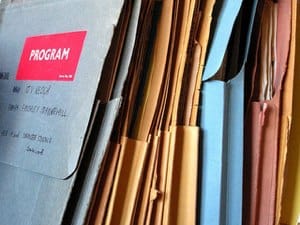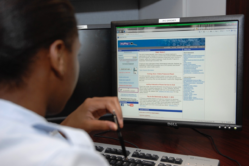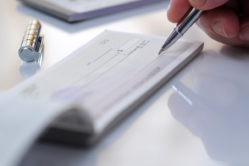My husband and I keep a small safe in our house for all of our important papers—from our passports to my son’s birth certificate to our social security cards. One afternoon last summer, not long after I had opened the safe to retrieve something and left the top up, my husband decided to set a full humidifier on top of the open safe—and, of course, the inevitable happened.

After that seminal moment in our marriage, I spent an interesting hour clothes-pinning all of our important documents upon a makeshift clothesline in our bathroom so they could dry. I also started looking into whether our safe was the most secure place to keep all of our documents.
Aside from the (admittedly unusual) issue of flooding, I needed to know which papers are better placed in a safety deposit box and which ones are perfectly fine in your average fireproof home safe. This is what I discovered:
Safety Deposit Box
While the movies may have led you to believe that this is where people stash stolen jewelry, hundreds of thousands of dollars in cash, fake passports, and other illicit materials, the fact of the matter is that safety deposit boxes are the best place to store any paperwork that you would have trouble replacing.
That list of important documents includes birth, marriage, and death certificates, adoption papers, divorce decrees, citizenship records, military records, deeds, titles, wills, and stock and bond certificates. All of these items are of vital importance and should be protected against the possibility of fire, flood, or burglary at your home.
The cost of renting a safety deposit box is relatively inexpensive, and it offers you security and privacy. (However, you should remember that the items in a safety deposit box are not FDIC insured.) Also, that privacy can end up being a Catch-22, particularly if you make the mistake of keeping your original copy of your will—or other important legal documents—in the box. Safety deposit boxes are sealed after the death of the box-holder, meaning your heirs may not have access to the legal information that proves they are your heirs.
This is part of why every family should have a safe home and a safety deposit box. Then you have a safe place at home where you can keep information for your family about accessing your safety deposit box in the event of your death or incapacitation.
What to Put in a Safety Deposit Box
A safety deposit box serves several functions – keeping your important documents or other items in a secure, off-site location. In many cases, a safety deposit is probably safer than a lockbox in your home – it is more difficult to break into and limits access. But that limited access can also be a problem if you need quick access to certain documents or other valuables.
For that reason, you don’t want to keep documents or other valuables you may need at a moment’s notice, including your passport, original copies of your will, estate plans, power of attorney, burial preference, medical documents, living will, and similar items. In the event of your death, it may take a court order to unseal your safety deposit box, causing a delay in settling your estate. You should leave copies of your will with your estate executor and your attorney.
Personal items to keep in a safety deposit box:
- Birth, Marriage, and Death certificates
- separation/divorce papers
- Military records such as the original copy of a DD Form 214.
- Copy of will, estate plan, burial preference, and/or power of attorney
- Copy of life insurance
- Copies of legal documents / business documents
- Copy of passport
- Copy of college degree
- Copy of professional license
- Copy of Social Security Card
- Copy of health records (immunizations, surgeries, hospitalizations, etc.)
Property and investments:
- Original stock certificates
- U.S. savings bonds, other bonds and Treasury securities
- Contracts
- Deeds, titles, title insurance for home, automobiles, and other property
- Home inventory (can be photos, DVD, VHS, etc.)
- Copy of homeowner’s insurance
- Copy of receipts for home improvements
- Coins, jewelry, etc.
Note: A safety deposit box is often safe from prying eyes and thieves but is not airtight or watertight. It is recommended to keep all items in a Ziploc bag or other waterproof container to protect them from moisture, flooding, sprinkler systems, etc.
Home Safe or Fireproof Box
The most important information you can place in your home safe is information and instructions for your family regarding where you keep your safety deposit box and how to access it, as well as the contact information for your lawyer, your insurance agent, your financial planner, and your bank. This is all information that could be of vital importance to your family in the event of your death.
In addition to this information, your home safe is also where you will want to store other documents and records that you may need to access more often. Those documents include your social security card, passport, tax information, insurance policies, health records, education records, loan information, employment records, bank statements, and other financial documents.
The home safe is also a good place to keep photocopies of certain documents, like your driver’s license and birth certificate. Both of those pieces of ID could be important to show in case you lose the original of either. Also, having a photocopy of your child’s birth certificate means that you have his necessary identification for travel and other needs without having to worry about losing the original document.
Veterans should maintain a copy of their DD Form 214 in their home safe and the documents required for a military burial. Maintaining these in your home safe will ensure you have access to your proof of military service at a moment’s notice, and your family can arrange for a military burial if you pass away.
You should also plan on keeping a copy of your will in both your home safe and your safety deposit box, in addition to keeping a copy at your lawyer’s office. This will mean that your family has all the necessary information available to them.
It goes without saying that your home safe should be fireproof and always kept locked (and not just because of freak humidifier accidents). In addition, make sure you stow the safe in an out-of-the-way spot in your house—the better to keep potential burglars from noticing it.
How to Choose and Purchase a Fireproof Safe or Lockbox
A fireproof safe is a great place to keep important documents, photos, and computer backups of sensitive information. There are many factors to consider, such as the level of protection offered, what you will be storing, cost, etc.
The most important thing to consider is the items you will be storing.
- How large are the items that require safeguarding?
- Will you be storing anything with special preservation needs (antiques, collectibles, firearms, jewelry, archival quality documents, memorabilia, etc.)?
Choosing a fireproof safe.
- Evaluate needs. Consider space requirements, value and type of items to be stored, amount of necessary security, etc.
- Evaluate fire ratings. Common classifications include UL 72, UL 125, and UL 350. The UL (Underwriter’s Laboratories) numbers represent the allowed internal temperature when exposed to fire – usually tested by exposure to fire for one hour at 1700 degrees. Data storage safes. Most photos, CD’s, flash drives, and other electronic media suffer damage at temperatures 140F or higher, so go with a rating of UL125 or lower if you store electronic data. Document storage safes. A safe with a rating or UL 350 is good for most documents.
- Look for a GSA-approved safe (Government Service Administration). GSA-approved safes are often similar to those used by the government for the storage of classified information. If it’s good enough for top secret information, it’s good enough for your financial records and other important valuables.
- Evaluate burglary classification. TL-15 and TL-30 are common classifications, with the TL-30 offering more protection.
- Compare prices. On the low end, you can purchase a fireproof safe for close to $100 (prices vary). On the high end, you can go into the thousands, depending on size and features. Make sure you find a safe that meets or exceeds UL testing standards.
Choosing a fireproof lockbox.
- Evaluate needs. Most fireproof lockboxes are smaller than safes and are designed for documents and other small items.
- Fire protection. Again, check the ratings as listed above. Many, but not all, fireproof lock boxes are rated for electronic data.
- Burglary protection. Most lock boxes are not as secure as a safe – you can even order replacement keys for some models. The value here is in fire protection, not protection from thieves.
- Prices. Prices range from $25 and up.
Consider signing up for a home security service
The above items are important for safeguarding your valuables, but another item to consider is a home security service to monitor your home for break-ins or other emergencies. A home security service may alert authorities to emergencies with enough time to prevent catastrophic loss of valuables or catch any thieves who are breaking into your home.
Using a monitored home security service can help you protect your home and valuables from burglars, fires, and other events.
The Bottom Line
Even when it is not waterlogged, organizing the paper beast can be overwhelming. But knowing that your important documents are stowed in places where they will be safe but accessible in case of emergency is worth taking the time to do.
Image credit: jovike



Comments:
About the comments on this site:
These responses are not provided or commissioned by the bank advertiser. Responses have not been reviewed, approved or otherwise endorsed by the bank advertiser. It is not the bank advertiser’s responsibility to ensure all posts and/or questions are answered.
Tushar @ Everything Finance says
We admittedly have a ton of paper kicking around that is fairly important. I can’t imagine the panic that would ensue if it got damaged or went missing. Safety deposit boxes are a good idea, but then so is scanning the documents and storing it on a cloud. That way you always have backups.
Ryan Guina says
I agree, Tushar. I have almost everything backed up in digital format. That makes it easily accessible on your computer, and easy to backup off-site if anything bad happens. It’s a great way to go.
Rob says
This is a great reminder for everyone. You never know when your home will be hit by some natural disaster, burned down, or even robbed.
I have had one problem though as a service member always on the move: to get a safe deposit box at a bank you often need to have an account there.
I have been banking with USAA for years so I find no need to switch banks with every PCS. But I have frequently had to open a checking account and deposit a token $5 just to have the privilege of renting a box at a local bank. That’s if I can find a bank that won’t charge me a monthly fee for the honor of holding my $5.
Finally, don’t forget that your bank may be susceptible to the same natural disasters as your home. For example, if your safe deposit box is at a bank at the end of the block, it will likely get flooded along with your home. A rising storm surge isn’t required to avoid banks. This is real belt-and-braces kind of stuff, but just another thing to think about.
Thanks!